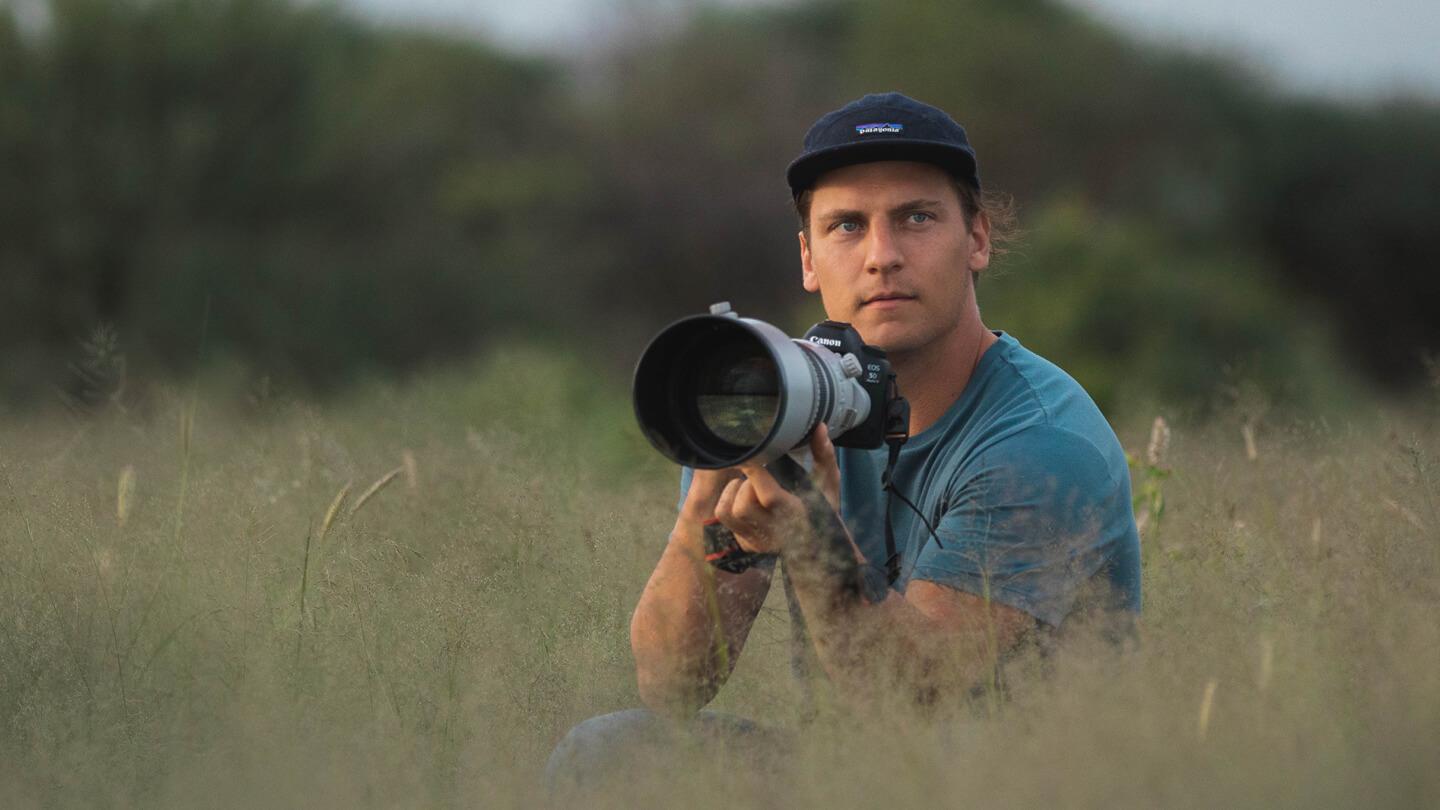The capitalist environmentalist: Chase Teron finds the perfect balance

Left brain, right brain; art, commerce; compassion and profit; world travel and conservation. Chase Teron, BCom ’12, seems full of contradictions—which just may be the secret to his success as a professional wildlife and nature photographer as well as environmentalist.
Growing up near Banff, Alberta, Teron loved exploring the great outdoors. He used acrylics and watercolours to capture the beauty of Alberta’s mountains and wildlife. But when it came time for university, he listened to family and friends who advised him “not to pursue art, and to get a real job.”
Inspired by his business-savvy father and grandfather, Teron attended business school at UVic. At first, he thought the only way to become successful was to invent something new, then “create a patent, sell a million of that widget” and get rich. “I had a very shallow way of looking at it,” he confesses.
After reading countless case studies and business books, Teron had an epiphany: “Businesses exist to help people, and money is a by-product of helping a lot of people.” He didn’t have to invent a widget—he just needed to help solve a problem: “And there are a million new problems created every day.”
Following his passion for the outdoors
After university, his path to entrepreneurship took a small detour in Calgary. “I got sucked into the energy industry and felt like I sold my soul after the first month,” he says. To fight his anxiety, Teron returned to his childhood passion for the outdoors: “I sold my car, got the best camera you could get anywhere and went into nature and created art.”
Teron then posted his photos on Instagram. “I got 20,000 or 30,000 followers within the first six months,” he recalls. With so many people loving his photography, he realized that art did indeed have the potential to become a “real job.”
Soon after, Teron and his girlfriend (now his wife), Jenni Lisacek, signed up as photography teachers on a National Geographic tour of Greenland. But on the morning the boat was leaving port the pair learned they would also be the guides for Greenland and travel with a Russian crew who spoke little English.
Instead of panicking, Teron and Lisacek brainstormed how to make the trip successful for the other passengers. “We decided to be super positive and happy, and pretend like we knew what we were doing,” he says. The trip ended eight days later with a boat full of happy customers and a galvanized Teron: “My goal was to travel the world and show people why they should care about the planet.”
This led to the birth of Artica Studios, which the pair founded 10 years ago and today is an eco-tourism media company. “It was originally a photo-tour company that we created while working a corporate job,” Teron explains.
He and Lisacek led tours during their vacations and saved as much money as possible. “We never took out a loan. We never did a business plan—we created it based on sussing out the demand and pre-selling a trip before doing anything.”
Raising money for wildlife conservation
The COVID-19 pandemic put Artica on pause—and stranded the pair in Africa for six months. Again, finding opportunity in adversity, Teron helped some friends with the digital marketing for Prints for Wildlife, and over the last three years this campaign has raised $2.1 million USD for wildlife conservation efforts in Africa by selling photographic prints donated by renowned photographers.
Teron was inspired by the campaign’s success to contact Cristina Mittermeier and Paul Nicklen, founders of SeaLegacy (a marketing, education and communication agency for the ocean) and establish 100 for the Ocean. Teron describes this as “a print fundraiser in which 100 of the world’s best artists and photographers come together in the name of ocean conservation.” From May 1 to 31, 2023, prints by photographers such as Steve McCurry and Pete Souza were sold.
Expanding focus
Never one to slow down, Teron is also involved in companies such as Savage (the world’s first carbon-neutral non-fungible tokens marketplace) and Persistence AI (real estate software). Artica has expanded and, in addition to photo tours of Norway, Greenland and Vancouver Island, now offers digital marketing for photographers.
“I go crazy if I’m always doing the same thing every day,” Teron says. “To become a cog in a wheel? Life is too short for that.”
At this point in his career, Teron is striving to maintain the perfect balance of creating art, helping people, promoting conservation and making money. “I’m losing hair for a reason,” he says with a laugh. “I can be a capitalist environmentalist. You can have economic upside if you treat the world with respect and compassion, and you should be rewarded handsomely for that.”
Advice for aspiring entrepreneurs
Teron credits the business sustainability classes he took at Gustavson for sparking his initial interest in the topic. One benefit of business school, he says, is “the ability to dabble in a bunch of different fields that you didn’t know existed.”
Whenever Teron meets business students or aspiring entrepreneurs, he advises them to build strong relationships, be resourceful, learn as much as possible and, above all else, show compassion: “More compassion is needed, not only for the environment, but for our own journeys.”
But how can aspiring entrepreneurs tell if a chosen path is the right one? Teron replies, “When you wake up and you’re excited to go to work.”
—Sheri Radford. Photo credit: Chase Teron. Originally published in the Spring/Summer 2023 issue of Business Class magazine.

